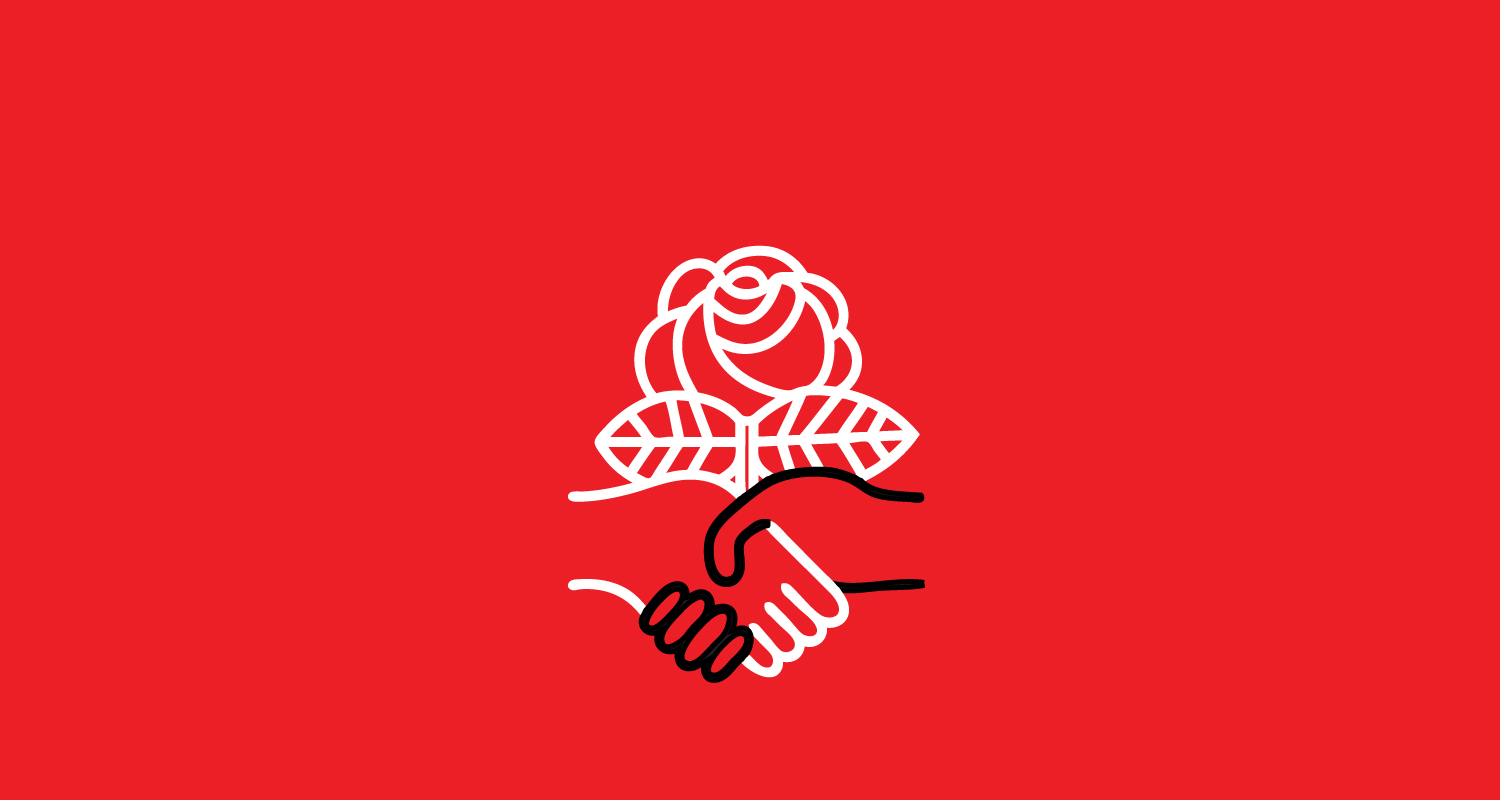Inside the biggest gathering of American socialists in decades
Can the Democratic Socialists of America become a strong political force?


Things are looking up for the Democratic Socialists of America. With a membership of 25,000, it is now the largest socialist group in America since the Second World War. And last weekend in Chicago, it held its largest convention, by a considerable margin, in its history.
The event was a fascinating view into an organization that is simultaneously struggling with sudden success and looking to capitalize on fertile conditions to grow even more.
Membership has more than tripled in a year, gaining a large boost from the candidacy of Bernie Sanders and an even bigger one from the election of Donald Trump. Something like 1,500 people joined on Nov. 9, 2016, alone — about average for an entire year before now, Joseph Schwartz, a longtime member of DSA's National Political Committee, told The Week. That sharp surge in new recruits — most of whom are fairly young — has created a fairly stark age bifurcation among members. Somewhat akin to Sanders campaign, there is an old guard of people who have been carrying the left-wing torch for years, and a recent surge of new members radicalized by the recession and the haplessness of the Democratic Party.
The Week
Escape your echo chamber. Get the facts behind the news, plus analysis from multiple perspectives.

Sign up for The Week's Free Newsletters
From our morning news briefing to a weekly Good News Newsletter, get the best of The Week delivered directly to your inbox.
From our morning news briefing to a weekly Good News Newsletter, get the best of The Week delivered directly to your inbox.
At the convention, the new recruits were reminded that radical politics involves a lot of tedious procedure. The parliamentary classic Robert's Rules of Order got a severe workout as delegates accustomed themselves to formal democratic mechanisms. Delegate seats (who get voting rights) were allocated to individual chapters based on their membership, then elected by the chapter. They then spent the bulk of the convention ironing out an agenda for the next two years. They considered proposed amendments to the DSA constitution, voted on resolutions to endorse ideas and policies, and elected a new National Political Committee (NPC).
There were moments of acrimonious debate over a few topics, but ultimately most of the major proposals were adopted with large majorities. Among other things, delegates voted to create a formal harassment and grievance policy, to endorse the Boycott, Divestment, and Sanctions movement (directed at ending the Israeli occupation of the West Bank and Gaza), to leave the Socialist International, to create a labor organizing committee, and to endorse Medicare for all as a major priority.
The DSA also took pains to make up for its shortcomings, particularly its demographics. The group is quite a bit more white, male, and educated than America writ large. Convention delegates were about 40 percent female and 20 percent minority, according to DSA statistics — not exactly the "Bernie bros" of the liberal imagination, but neither as diverse as they would like. This a major point of concern for both the leadership and membership. Just as one cannot get a full measure of social justice without a structural overhaul of the American economy, one cannot achieve that overhaul without enthusiastic support from the heavily brown, black, and female working class. So in addition to endorsing thoroughgoing anti-prejudice policy, the convention used typical techniques like "progressive stack" to favor less-heard voices during debate — reflecting the DSA constitution, which says that the staff appointed by the NPC must be half women and at least 20 percent minority.
Perhaps surprisingly for a socialist organization, there was also an emphasis on money. A presentation on DSA's finances emphasized that while the organization is flush, it will take hard work to keep it that way. In the past, only about half of new members have voted to renew their memberships for a second year, Schwartz told The Week. Simply maintaining their position means a lot of continuous recruiting.
A free daily email with the biggest news stories of the day – and the best features from TheWeek.com
Still, the DSA is feeling optimistic.
Looking back in history, you can see why. In the 20th century before the First World War, when inequality and capitalist dysfunction was at levels comparable to today, American socialism spread by leaps and bounds — at one point even signing up a fifth of the population of Oklahoma. That brief flowering was destroyed by schisms over war jingoism and by President Wilson, whose Attorney General A. Mitchell Palmer seized on anti-Bolshevik paranoia to repress the socialist left by force. The federal government could again attempt such tactics, but today there is no Soviet Russia and no world Communist movement to fuel popular anti-Red paranoia, and no prospect of a broadly popular war that would divide the left.
It remains to be seen whether DSA can continue their upward surge, or are in for a period of retrenchment, as happened after the Iraq War and George W. Bush's re-election, when DSA hit its membership nadir. But the conditions for socialist organizing haven't been so favorable in a century at least.
Ryan Cooper is a national correspondent at TheWeek.com. His work has appeared in the Washington Monthly, The New Republic, and the Washington Post.
-
 The best family hotels in Europe
The best family hotels in EuropeThe Week Recommends Top kid-friendly hotels with clubs, crèches and fun activities for children of all ages – and some downtime for the grown-ups
-
 Moon dust has earthly elements thanks to a magnetic bridge
Moon dust has earthly elements thanks to a magnetic bridgeUnder the radar The substances could help supply a lunar base
-
 World’s oldest rock art discovered in Indonesia
World’s oldest rock art discovered in IndonesiaUnder the Radar Ancient handprint on Sulawesi cave wall suggests complexity of thought, challenging long-held belief that human intelligence erupted in Europe
-
 The billionaires’ wealth tax: a catastrophe for California?
The billionaires’ wealth tax: a catastrophe for California?Talking Point Peter Thiel and Larry Page preparing to change state residency
-
 Bari Weiss’ ‘60 Minutes’ scandal is about more than one report
Bari Weiss’ ‘60 Minutes’ scandal is about more than one reportIN THE SPOTLIGHT By blocking an approved segment on a controversial prison holding US deportees in El Salvador, the editor-in-chief of CBS News has become the main story
-
 Has Zohran Mamdani shown the Democrats how to win again?
Has Zohran Mamdani shown the Democrats how to win again?Today’s Big Question New York City mayoral election touted as victory for left-wing populists but moderate centrist wins elsewhere present more complex path for Democratic Party
-
 Millions turn out for anti-Trump ‘No Kings’ rallies
Millions turn out for anti-Trump ‘No Kings’ ralliesSpeed Read An estimated 7 million people participated, 2 million more than at the first ‘No Kings’ protest in June
-
 Ghislaine Maxwell: angling for a Trump pardon
Ghislaine Maxwell: angling for a Trump pardonTalking Point Convicted sex trafficker's testimony could shed new light on president's links to Jeffrey Epstein
-
 The last words and final moments of 40 presidents
The last words and final moments of 40 presidentsThe Explainer Some are eloquent quotes worthy of the holders of the highest office in the nation, and others... aren't
-
 The JFK files: the truth at last?
The JFK files: the truth at last?In The Spotlight More than 64,000 previously classified documents relating the 1963 assassination of John F. Kennedy have been released by the Trump administration
-
 'Seriously, not literally': how should the world take Donald Trump?
'Seriously, not literally': how should the world take Donald Trump?Today's big question White House rhetoric and reality look likely to become increasingly blurred
